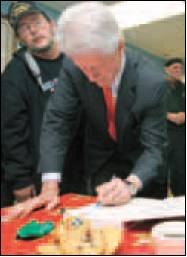The Young Lions of Able Troop
To the Cadre on the Front Lines Of Improving Care at Walter Reed, The Challenge Can Rival Combat
Watchful Eyes at Walter Reed
The new warrior transition brigade at Walter Reed Army Medical Center imposes needed order on its 700 outpatients.
By Steve Vogel
Washington Post Staff Writer
Thursday, April 10, 2008; Page B01
Army Maj. Steven Gventer stuck his trusty Garmin GPS on the windshield of a white van idling in a garage before dawn at Walter Reed Army Medical Center.
This Story
The Young Lions of Able Troop
Watchful Eyes at Walter Reed
Special Report: Walter Reed and Beyond
"Take us to Glen Burnie, darling," Gventer instructed.
An Army lieutenant, a hospital outpatient, was missing. Gventer was angry that an officer under his command hadn't shown up at Walter Reed for four days -- normally the lieutenant would be considered absent without leave -- but he was also concerned: Doctors had diagnosed depression in the young man after he served in Iraq.
"I need to look him in the eye and find out what's going on," Gventer said.
A year ago, the officer's absence might not have been noted, much less have prompted a search. Case managers, each with dozens of outpatients, were overwhelmed. The lack of accountability, including soldiers left to live in broken-down apartments and mired in medical bureaucracy, was documented last year by The Washington Post.
The Army's response included bringing in combat veterans to impose military order on the medical task of tracking recovering soldiers. The approach, which the Army is replicating across the country, depends on the decisions of a small group of officers such as Gventer, a cavalry trooper without a medical background, and on young squad and platoon leaders new to the world of helping heal physical and psychological wounds.
As commander of Able Troop of the Walter Reed Warrior Transition Brigade, Gventer was responsible for 240 of the medical center's 700 outpatient soldiers. In the two weeks before he searched for the missing lieutenant, he and his sergeants had saved the lives of two soldiers, including one who tried to kill himself with alcohol and pills.
Initially, the combat cadre had trouble adapting to the civilian atmosphere at the hospital and clashed with the medical system. Soldiers complained that some improvements were cosmetic. The brigade was criticized for pursuing criminal charges against a lieutenant recovering at Walter Reed who had attempted suicide in Iraq.
But a year into it, the Army can point to progress: Congress and government auditors say the system is improving. In a poll of recovering soldiers released last month, 71 percent said the military health system is on track.
"There's more we want to do," said Col. Terrence J. McKenrick, the brigade commander, who is recommending that the Army beef up the Walter Reed unit. The ratios -- one squad leader for every 12 soldiers, one caseworker for every 18 and one doctor for every 200 -- are still too high, he said.
Army leaders have enough confidence in the approach that they have set up similar units at 34 posts. Gventer has been assigned to the Army surgeon general's office to help with the broader effort. As he left Walter Reed last month, commanders credited him with helping turn around outpatient care. "Steve has always been at the center of gravity," McKenrick said.
Monday, 8:30 a.m., Wagner gym
/////////////////////////////////////////////////////////////////////////////
This is a 5 page article and you really should go to the Washington Post site to read the entire article, my hat is off to them on this story. Thank you
Thursday, April 10, 2008
The Young Lions of Able Troop
Subscribe to:
Post Comments (Atom)

No comments:
Post a Comment